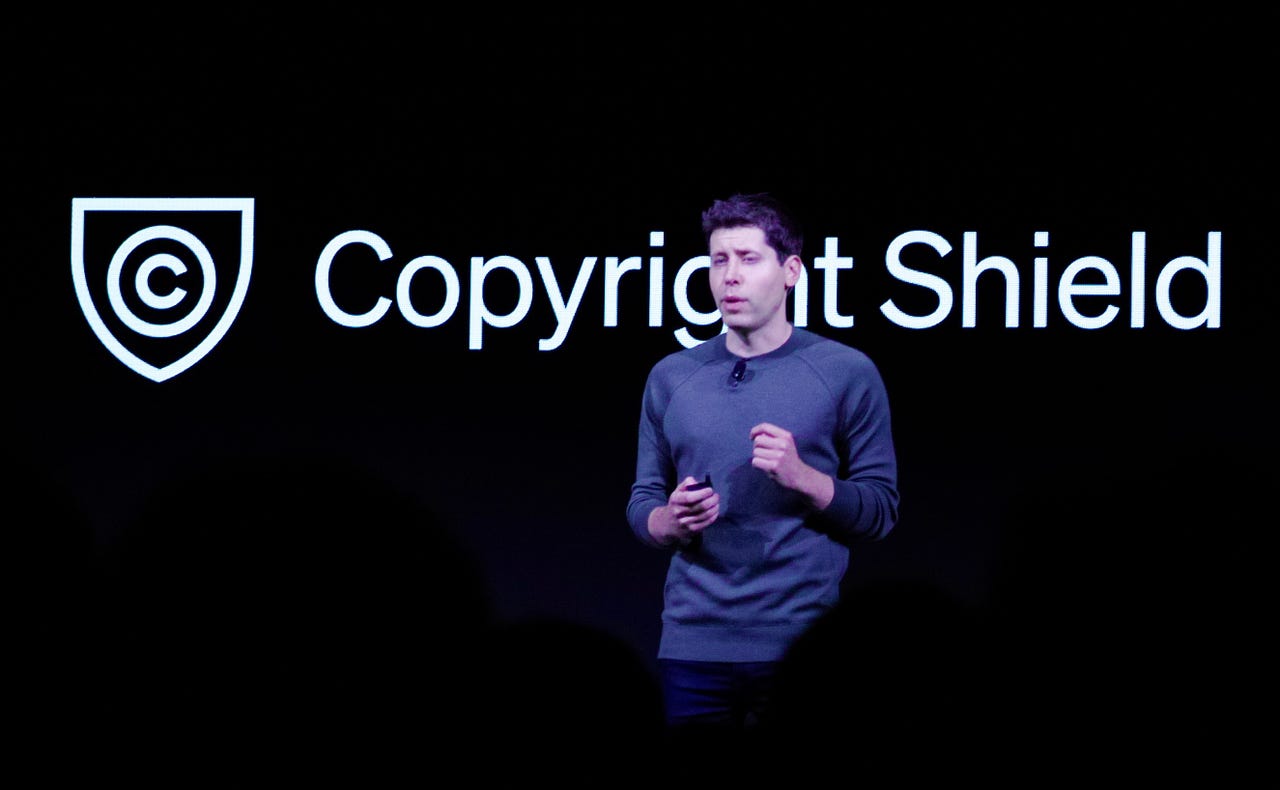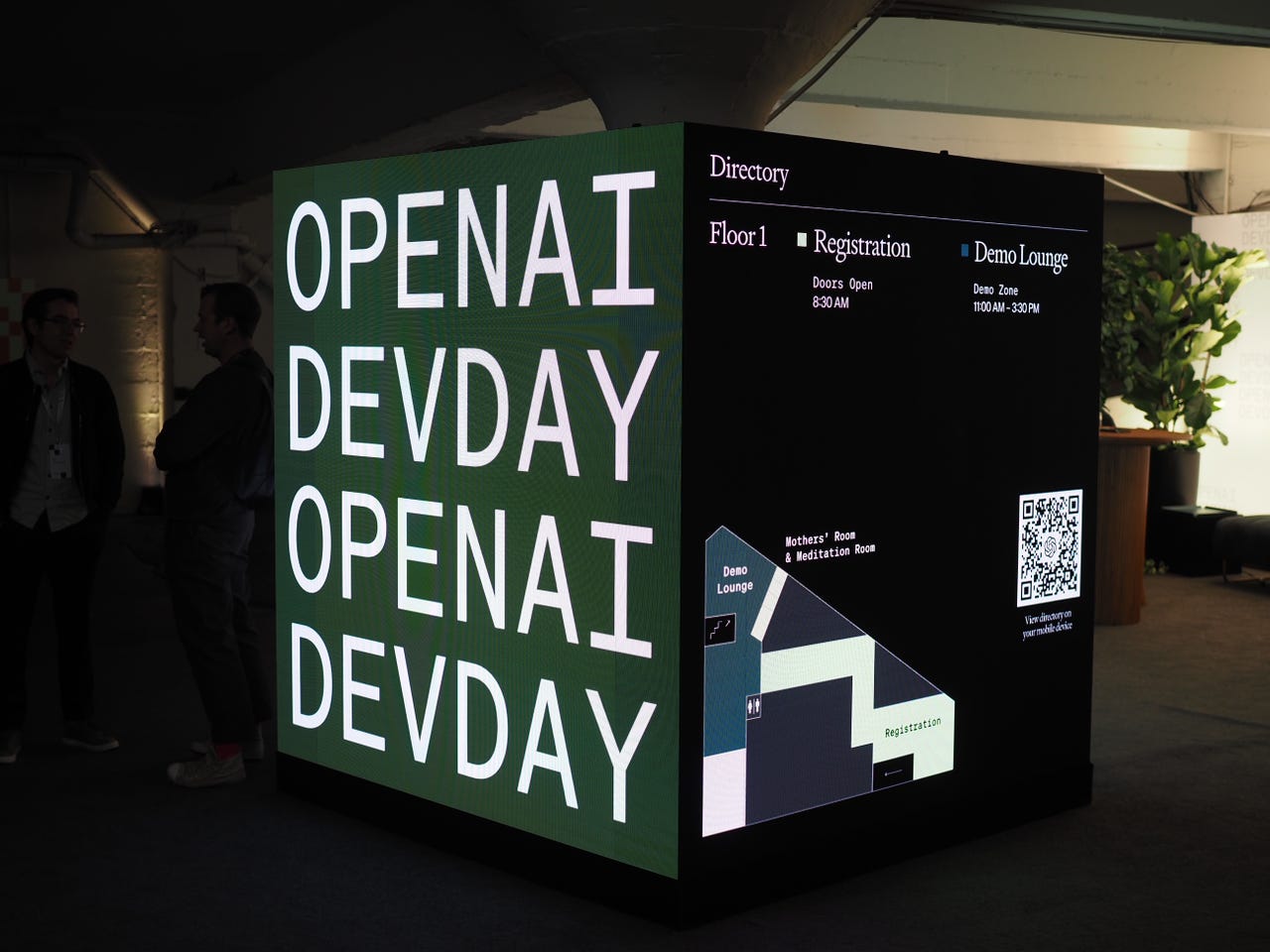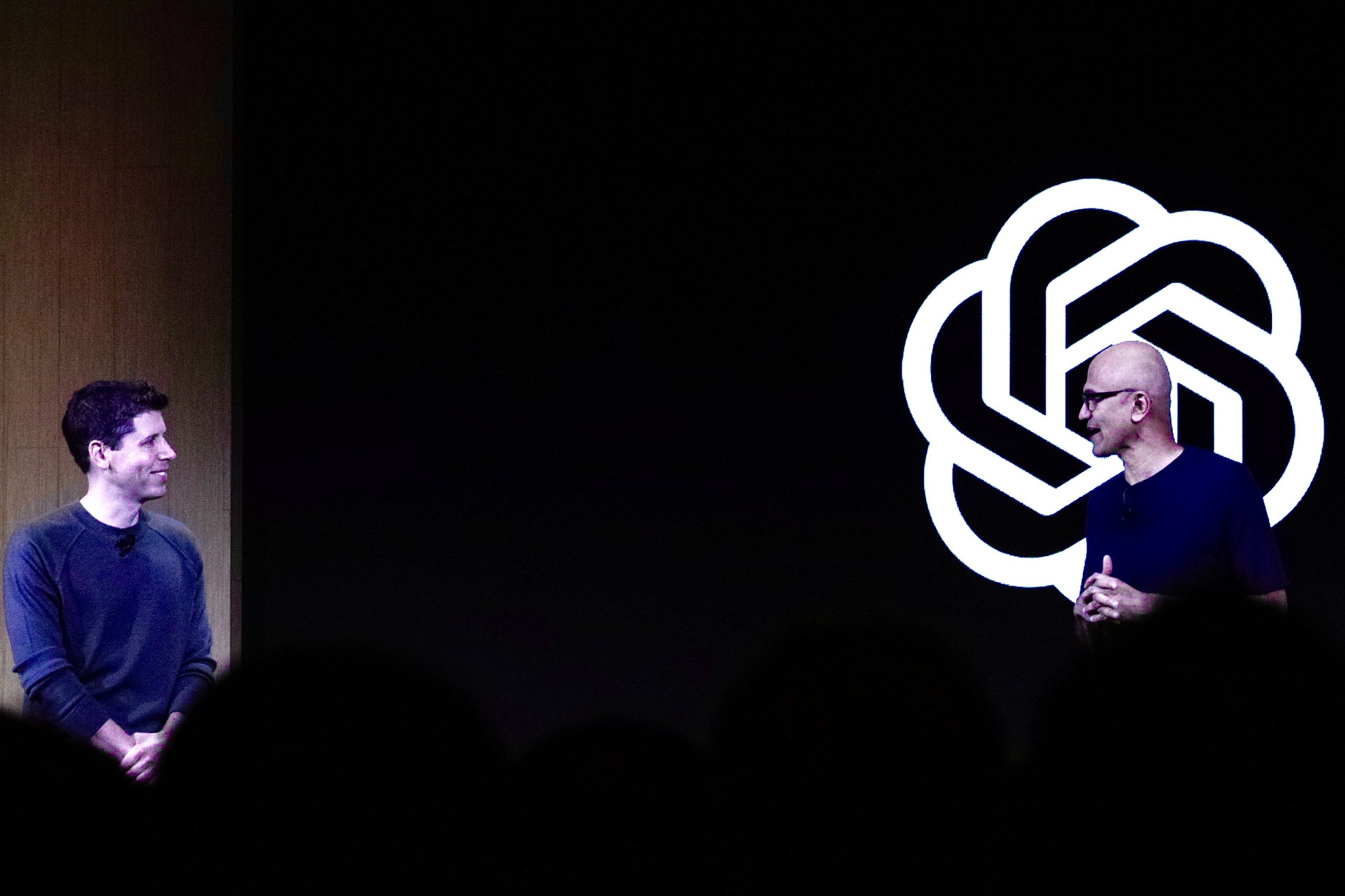Microsoft CEO Satya Nadella took the stage during OpenAI CEO Sam Altman’s presentation to talk about the future of their partnership. Tiernan Ray
San Francisco – Monday OpenAI, the creator of ChatGPT and GPT-4, held its first ever developer conference, called Dev Day. The company unveiled “GPTs”, a way to easily create custom versions of ChatGPT, a store to find and purchase custom ChatGPTs, an “Assistant” API to make it easier for developers to call specific functions for their apps, as well as many other features and updates.
First, Sam Altman took the stage and recalled the different stages of product launch: ChatGPT a year ago, followed by GPT-4, which is “still the most powerful model” of the company.
The company said more than 2 million developers use its APIs “for a wide range of use cases.” Use cases tested by 92% of Fortune 500 companies. ChatGPT itself has approximately 100 million weekly active users.
Nadella: “You have built something magical”
Mr. Altman then launched into a rapid enumeration of the many innovations that are coming. Announcements were applauded wildly: the crowd was enthusiastic and cheerful.
Mr. Altman brought a special guest on stage: Satya Nadella, the CEO of Microsoft. Mr. Altman jokingly asked Mr. Nadella, “How does Microsoft envision this partnership?” This question sparked laughter from Mr. Nadella and the audience.
“You have built something magical,” said Mr. Nadella, who then detailed the benefits of this partnership.

![]()
The venue for Dev Day, SVN West’s event space in downtown SF. Tiernan Ray
The main new products and technologies are:
- GPTs: Custom versions of ChatGPT that, according to OpenAI, “anyone can easily build” for specific tasks. The company offers two first custom GPTs, Canva and Zapier AI, for design and workflow
- GPT Store: During November, OpenAI will open the GPT Store, to benefit from personalized GPTs built by others. Developers will be able to earn money from their creations
- Copyright Shield: the possibility for OpenAI customers to have their defense taken care of in the event of an attack for infringement of intellectual property
- Fine Tuning: a fine configuration service for GPT-4 for developers;
- Custom Model: a custom model program for businesses, a team of OpenAI researchers who will work with “selected organizations” to “train GPT-4s customized to their specific domain”
- A new user interface for ChatGPT: a simple, dark background with the OpenAI logo and the phrase “How can I help you today?”. The new user interface will make it easier to juggle between ChatGPT and DALL-E, OpenAI’s imaging program
- New source update: GPT-4’s news source is updated through April 2023. This is a big step forward from the program’s traditional cutoff of September 2021. ChatGPT is also able to perform searches in PDF documents and others
- More content in the pop-up: GPT-4 sees its “context window”, that is to say the amount of information it can take into account to formulate a response, multiplied by four, from 32,000 to 128,000, in a new version “Turbo.” (For more information on the different characteristics of GPT models, see the OpenAI website)
- Images in the prompt: GPT-4 Turbo can now accept images in a prompt and can generate “human-quality speech” as output
- API Wizard: a function calling mechanism that makes it easier for developers to integrate specific “helper” functions into their applications, such as “a natural language-based data analysis application, a coding assistant, a AI-powered vacation planner, a voice-activated DJ
- Reproducible results: a new “seed” parameter allows GPT to return “reproducible results” “most of the time”;
- Best for code generation: a new version of GPT-3.5 Turbo which improves the management of functions and JSON;
- New pricing policy: reducing the price of GPT-4 Turbo and GPT-3.5 Turbo, based on the price per input and output token, and doubling the rate of “tokens per minute” that can be used.
Custom OpenAI models for businesses: difficult to do and… expensive
On stage, Mr. Altman demonstrated custom GPTs, writing from scratch a program called Startup Mentor, which aims to give advice to entrepreneurs. He demonstrated how to download a file from a lecture that he had given as an example of generating via external sources. The program is designed to answer questions like “What are three things to look for when recruiting people for a startup?
As for custom designs, however, Altman said, “We won’t be able to do it with a lot of companies initially, and it won’t be cheap.”
The Copyright Shield program, Mr. Altman said, “means we will step in to defend our clients” in the event of litigation, “and we will absorb the cost.”

The copyright protection program, Mr. Altman said, “means we will step in to defend our clients” in the event of litigation, “and we will absorb the cost.” Tiernan Ray
Avoid resending the entire conversation history with each new message
OpenAI says a key part of the Assistant API is “persistent threads,” which “allow developers to avoid resending the entire conversation history with each new message and bypass window constraints.” contextual”.

Tiernan Ray
The new GPT-4 Turbo is available immediately as a preview, OpenAI said, bypassing the gpt-4-1106-preview command to access the OpenAI API. A stable version should be released “in the coming weeks”.
GPT-4 Turbo does a better job, according to the company, of following specific instructions, such as producing a response in XML. It also allows you to obtain responses in JSON using a new parameter, “response_format”.
Something new on the price side
The new seed setting for GPT-4 is a beta feature that “is useful for use cases such as replaying queries for debugging, writing more comprehensive unit tests, and in general a greater degree of control over the behavior of the model,” the company said.
The announced price cuts mean that GPT-4 Turbo, for example, is now one cent per input token, up from three cents, and three cents per output token, up from six cents – which the company calls of “three times cheaper” and “half cheaper”, respectively.
